Unit 10 You're supposed to shake hands.单元检测课件(共96张PPT)
文档属性
| 名称 | Unit 10 You're supposed to shake hands.单元检测课件(共96张PPT) | 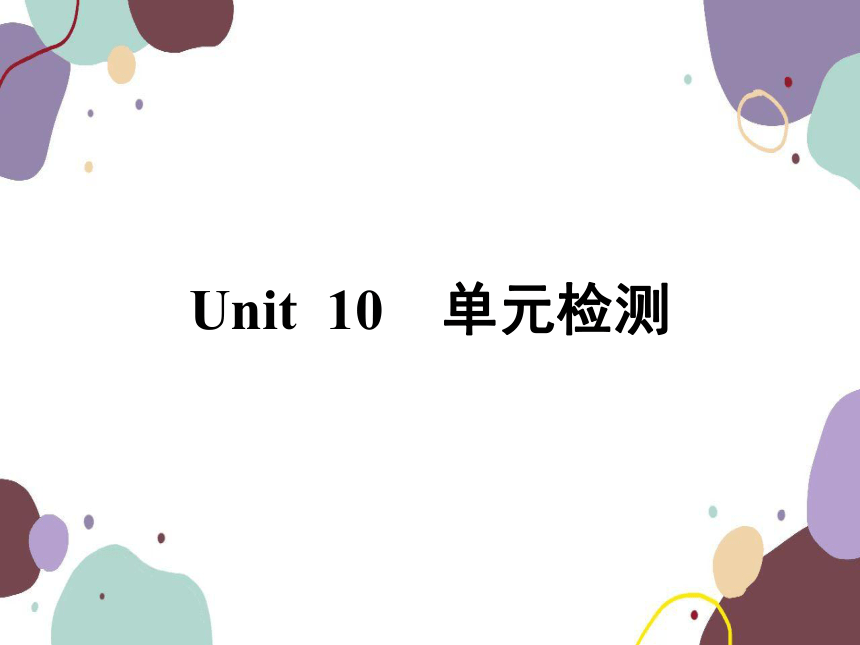 | |
| 格式 | pptx | ||
| 文件大小 | 445.0KB | ||
| 资源类型 | 教案 | ||
| 版本资源 | 人教新目标(Go for it)版 | ||
| 科目 | 英语 | ||
| 更新时间 | 2022-10-16 18:34:40 | ||
图片预览

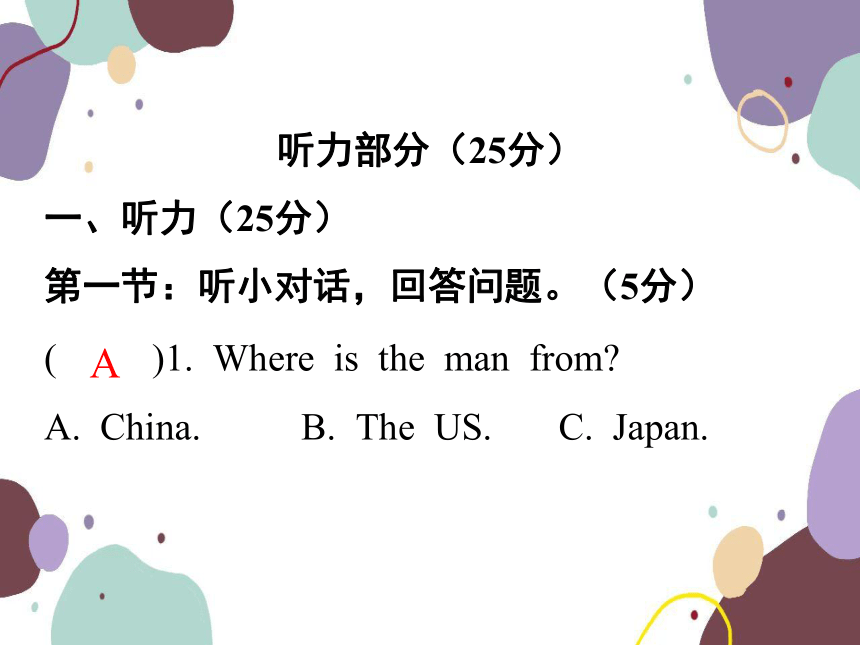
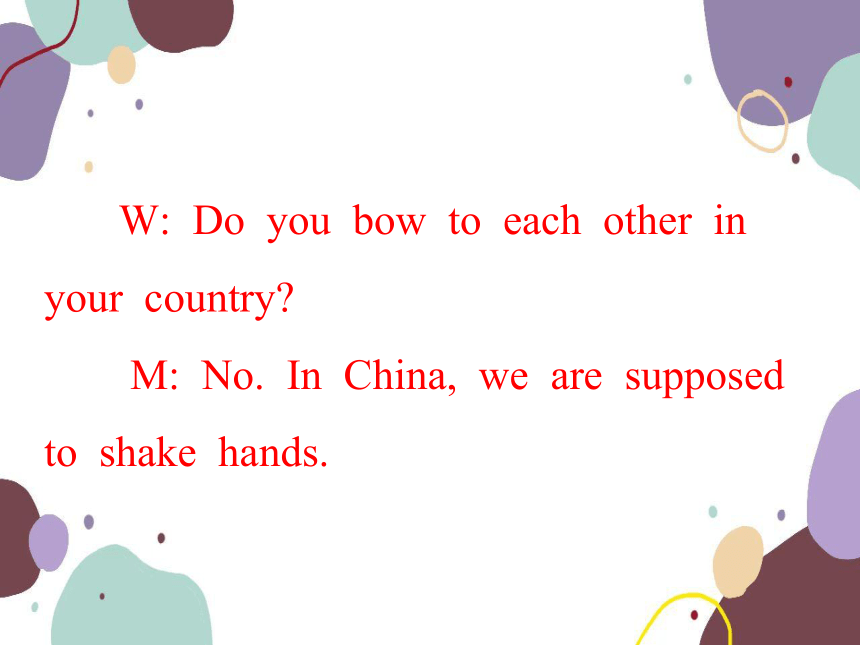
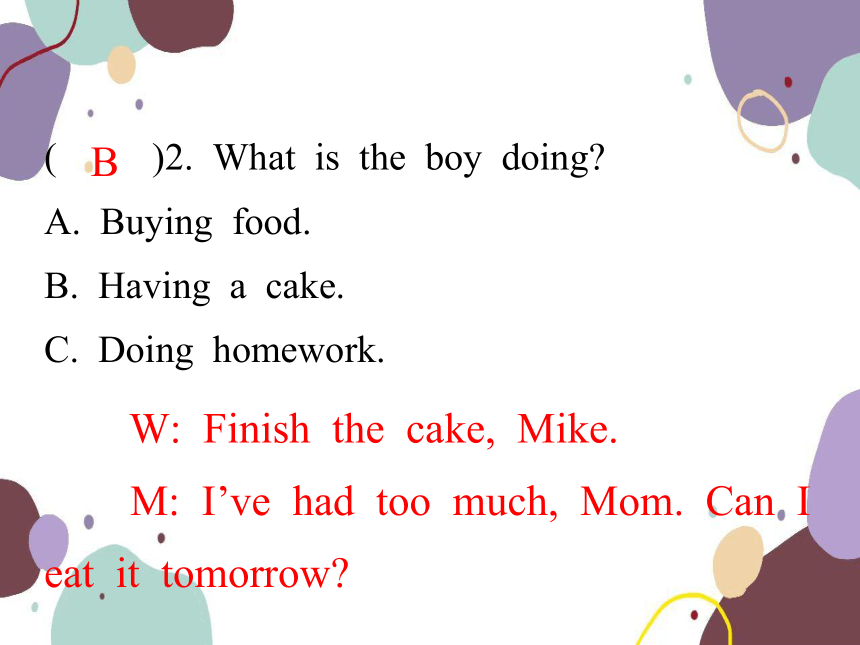
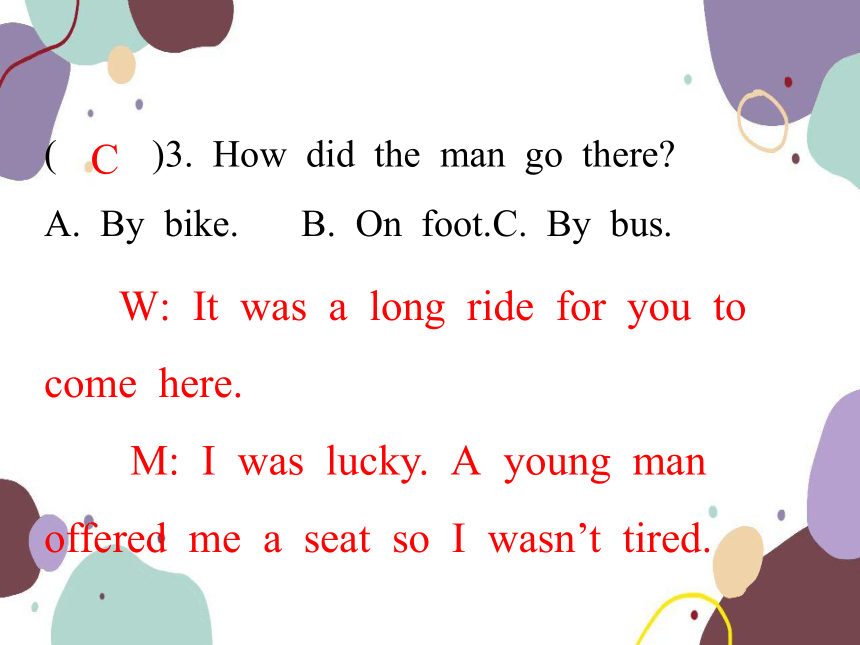
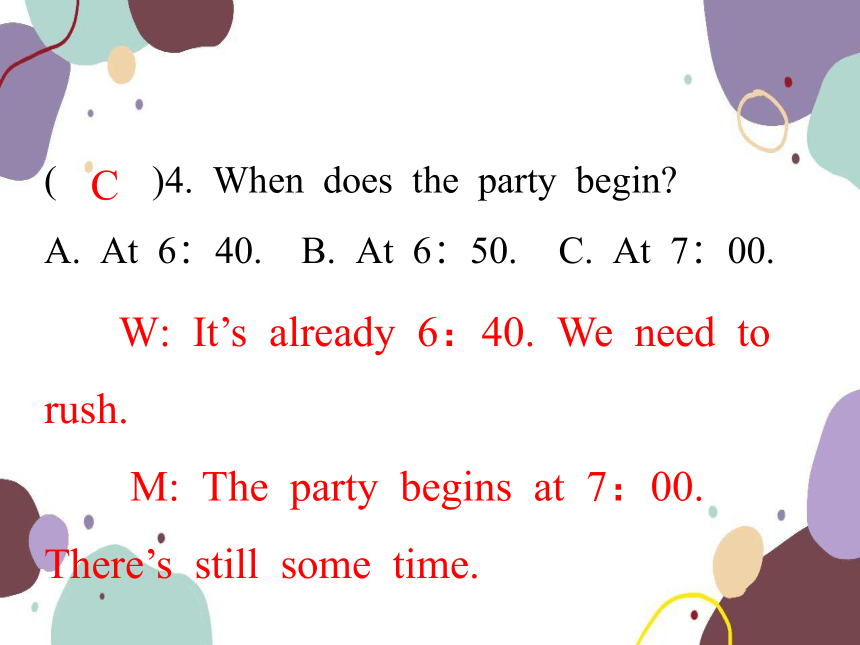
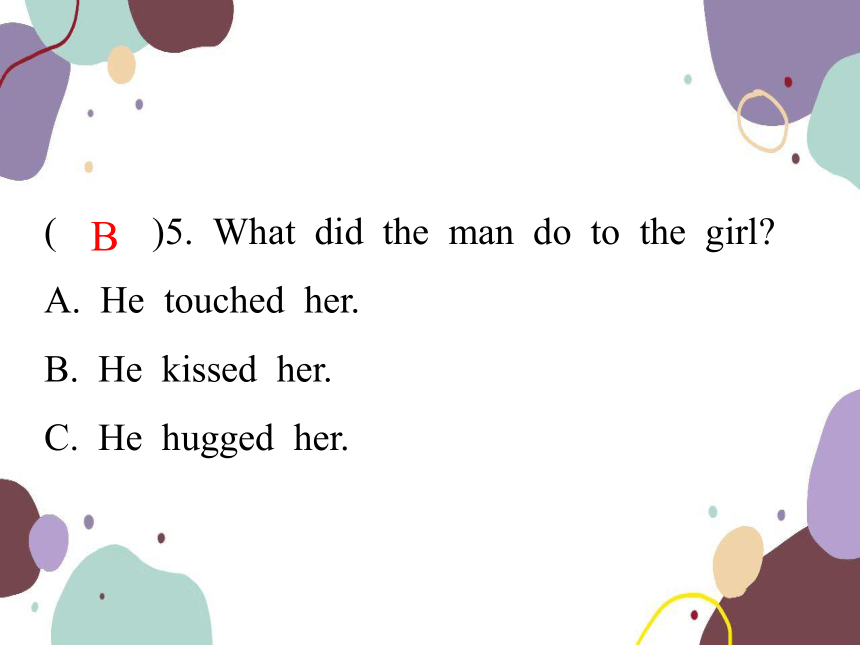

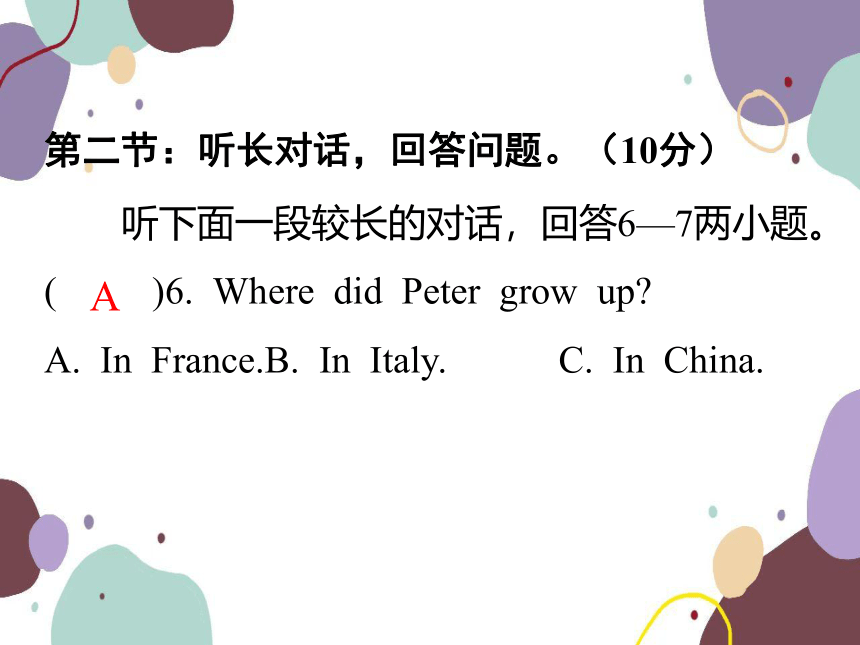
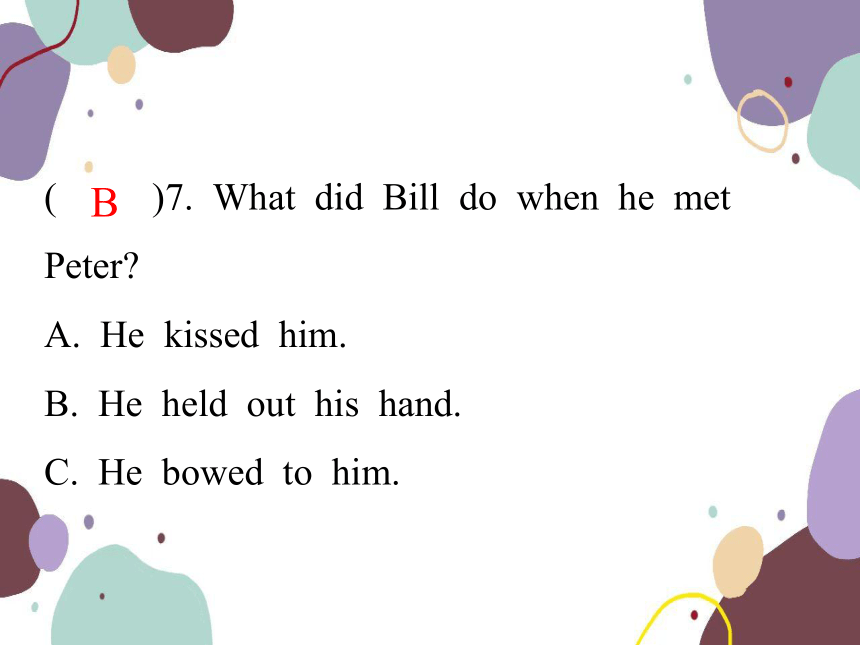

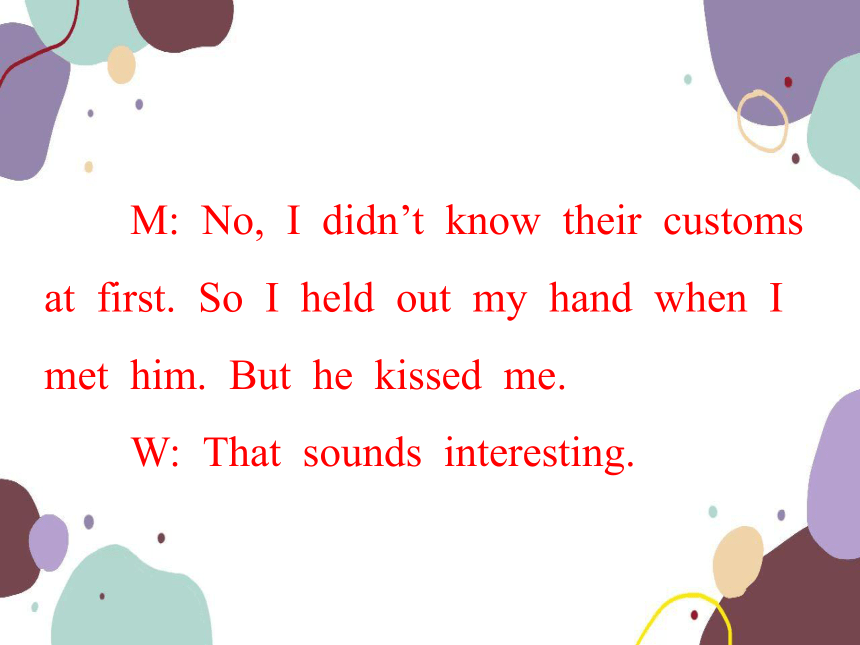
文档简介
(共96张PPT)
Unit 10 单元检测
听力部分(25分)
一、听力(25分)
第一节:听小对话,回答问题。(5分)
( @1@ )1. Where is the man from
A. China. B. The US. C. Japan.
A
W: Do you bow to each other in your country
M: No. In China, we are supposed to shake hands.
( @3@ )2. What is the boy doing
A. Buying food.
B. Having a cake.
C. Doing homework.
B
W: Finish the cake, Mike.
M: I’ve had too much, Mom. Can I eat it tomorrow
( @5@ )3. How did the man go there
A. By bike. B. On foot. C. By bus.
C
W: It was a long ride for you to come here.
M: I was lucky. A young man offered me a seat so I wasn’t tired.
( @7@ )4. When does the party begin
A. At 6:40. B. At 6:50. C. At 7:00.
C
W: It’s already 6:40. We need to rush.
M: The party begins at 7:00. There’s still some time.
( @9@ )5. What did the man do to the girl
A. He touched her.
B. He kissed her.
C. He hugged her.
B
W: No, you were not supposed to kiss the girl on the face here.
M: Really I’m so sorry. I thought it would be polite for me to do so.
第二节:听长对话,回答问题。(10分)
听下面一段较长的对话,回答6—7两小题。
( @11@ )6. Where did Peter grow up
A. In France. B. In Italy. C. In China.
A
( @12@ )7. What did Bill do when he met Peter
A. He kissed him.
B. He held out his hand.
C. He bowed to him.
B
W: Oh, Bill. What a lovely photo! Who is the boy in yellow beside you
M: He is my new friend Peter. He was born in Italy, but he grew up in France.
W: Did you kiss him or bow to him when you met him
M: No, I didn’t know their customs at first. So I held out my hand when I met him. But he kissed me.
W: That sounds interesting.
听下面一段较长的对话,回答8—10三小题。
( @14@ )8. What are they talking about
A. Traveling in Japan.
B. Body language.
C. Table manners.
B
( @15@ )9. Where did Sally meet the Japanese woman
A. At a restaurant.
B. At a dinner.
C. At a meeting.
C
( @16@ )10. Did the Japanese woman look at Sally
A. Yes, she did.
B. No, she didn’t.
C. We don’t know.
B
W: Matthew, do you know much about body language in countries around the world
M: Sure, Sally. I’ve picked up a few things from traveling around for work. Why
W: Well, I had a meeting today with a woman from Japan and she wouldn’t stop bowing! I didn’t know what to do!
M: Did you bow back
W: No, I tried to shake hands, but she didn’t shake hands with me.
M: Well, people bow to greet each other in Japan.
W: But she was in America! Shouldn’t she have known that shaking hands in America is a great way to greet each other
M: Things are different in Japan.
W: And she wouldn’t look at me at the meeting.
M: It’s impolite to look at others in Japan.
第三节:听独白,回答问题。(10分)
( @18@ )11. What did the host family do for the speaker
A. They made a cake.
B. They went out for a meal.
C. They gave her a present.
C
( @19@ )12. What do people probably do in China
A. They never accept others’ presents.
B. They don’t open a present in front of other people.
C. They always open a present as soon as they receive it.
B
( @20@ )13. What do we know about the speaker
A. She didn’t say thanks to her host family.
B. She forgot to open the present after the party.
C. She was afraid that she made her host family unhappy.
C
( @21@ )14. Who is Lily
A. The speaker’s friend.
B. The speaker’s teacher.
C. The daughter of the speaker’s host family.
A
( @22@ )15. What did Lily suggest the speaker do
A. Buy a present for her host family.
B. Send a thank-you note to her host family.
C. Learn something about American custom.
B
I have been in the US for one week and my host family is really nice. Yesterday was my birthday and they had a party for me at home. They bought me a cake, sang to me and gave me a present. Then I got back to my room to
open it after the party. But when I got to the university and talked about my present with my friend Lily this morning, she told me that I should have opened it when they gave it to me. You know we never open a present in front
of other people in China. I hope I didn’t make my host family unhappy. And Lily suggested me send my host family a thank-you note. I think I should learn something about American custom now.
笔试部分(95分)
二、完形填空(15分)
Germany is a highly developed country. Many people think its people lead a luxurious(奢侈的) life.
One day, my friend and I entered a restaurant. We noticed that a young couple were having their meal. There were 16 @24@ two dishes and two cans of beer on their table.
I wondered if such a(n) 17 @25@ meal could be fine and whether the girl would leave that
18 @26@ man.
As we were 19 @27@ , my friend ordered a lot of food for us. When we finished, there was still about one third of the food we had ordered on the table.
When we were leaving, the young man spoke to us in English. We 20 @28@that he was unhappy with us for 21 @29@ so much food. “We paid for our food. It is none of your 22 @30@ ,” my friend told him. The young man was so angry that he 23 @31@ took his phone out and made a call to someone.
After a while, 24 @32@ from the Social Security Organization arrived. Upon knowing what had happened, he gave us a 50-euro fine, which 25 @33@ us. The officer told us in a 26 @34@ voice, “ @35@ 27 is yours but resources belong to society. There are many 28 @36@ people in the world who are suffering from hunger.
We have no 29 @37to waste resources.”
Their attitude(态度) to eating put both of us to 30 @38@ . We need to correct our wrong opinion. We should realize that resources don’t belong to a single person but they belong to everyone. We can’t afford to waste them.
( @39@ )16. A. still B. even
C. already D. only
D
( @40@ )17. A. cheap B. simple
C. expensive D. common
B
( @41@ )18. A. rich B. stupid
C. mean D. friendly
C
( @42@ )19. A. full B. hungry
C. honest D. free
B
( @43@ )20. A. disagreed B. disappeared
C. understood D. doubted
C
( @44@ )21. A. ordering B. eating
C. serving D. wasting
D
( @45@ )22. A. business B. money
C. action D. point
A
( @46@ )23. A. slowly B. surprisely
C. exactly D. quickly
D
( @47@ )24. A. an officer B. a doctor
C. a postman D. a teacher
A
( @48@ )25. A. surprised B. upset
C. worried D. satisfied
A
( @49@ )26. A. relaxing B. serious
C. thankful D. boring
B
( @50@ )27. A. Money B. Decision
C. Right D. Freedom
A
( @51@ )28. A. old B. young
C. rich D. poor
D
( @52@ )29. A. use B. reason
C. need D. way
B
( @53@ )30. A. interest B. trouble
C. shame D. joy
C
三、阅读理解(30分)
Welcome a student from France or Spain into your family!
Host a student from Spain or France and experience his/her life and culture.
A
Exchange students from Spain and France are looking for welcoming warm, fun and loving hosts who will share life and culture with them for a few weeks in June, July and August.
Stays can be from 3 to 6 weeks.
What to do with your exchange student:
续表
Movies/Museums/Beach/Cooking/Baking/Community projects/Volunteering/Hanging out/Shopping/Disneyland/anything you can think of...
Requirements to host:
Loving, active, outgoing family
One stay-at-home, or part-time host parent
续表
Teen in the home within 4 years of age of the exchange student
Willing to take students to places of interest once a week
(maybe visiting them next summer at their home countries)
If you are interested and would like more information, please contact:
续表
Shirley Wentzell 909-918-6715
Email: Shirley@
续表
( @54@ )31. Exchange students from France or Spain will possibly stay for __ in host families.
A. 10 days B. 5 weeks
C. 2 months D. 1 year
B
( @55@ )32. According to the passage, we can learn that __.
A. exchange students will come back next summer
B. exchange students have to cook dinner by themselves
C. parents in a host family should have full-time jobs
D. teens in host families can experience different cultures
D
( @56@ )33. The text above is probably a __.
A. letter B. notice C. poster D. diary
C
B
America is a mobile society. Friendships between Americans can be close and real, yet disappear soon. They don’t feel hurt. If the same two people meet again, even years later, they will pick up the friendship. This can be quite difficult for us Chinese to understand.
Friendships between us develop more slowly but may become lifelong feelings, extending(延伸) deeply into both families.
There is another difficult point for us to understand. Although Americans treat friends warmly in their personal everyday lives, they don’t show their politeness to them if it requires a great deal of time.
But in China, we are usually generous with our time. We, as hosts, will appear at an airport even in the middle of the night to meet a friend. We may take days off from our work to act as guides to our friends. It is the opposite in America.
Americans cannot manage the time to do a great deal with a visitor outside their daily plans. They will probably expect the visitors to get themselves from the airport to the hotels. And they expect the visitors will phone them from there. Once the visitors arrive at their homes, the welcome will be full, warm and real.
For Americans, it is often considered friendlier to invite a friend to their homes than to restaurants, except for business matters. Americans are ready to receive us foreigners at their homes, share their holidays, and their home life. So accept their hospitality(好客) at home and enjoy your visit in America!
( @57@ )34. The underlined phrase “pick up” in paragraph 1 may mean “__”.
A. keep out B. give up
C. pay no attention to D. continue
D
( @58@ )35. Which of the following is a typical example of American hospitality
A. Treating friends at home.
B. Taking days off to be with friends.
C. Meeting friends at the airport at midnight.
D. Sharing everything they have.
A
( @59@ )36. Which of the following statements is TRUE according to the passage
A. Americans are always generous with their time.
B. Americans don’t feel hurt if their friendships disappear soon.
C. Chinese friendships develop more slowly but will never disappear.
D. Americans don’t like to invite a friend to their homes.
B
( @60@ )37. This passage is most probably written for __.
A. American students
B. Chinese students
C. Chinese visitors to America
D. American visitors to China
C
C
As a guest, you will be welcomed with open arms during mealtimes whenever Indian families gather. Habits of how and when food is eaten are based on social traditions, and most families form their special habits around cultural and family traditions.
Tasty vegetables
Since many Indians are vegetarians,the menu for everyday meals is based mostly upon a diet without meat. When meat is included in dishes, it is most commonly in the form of chicken or lamb, and sometimes seafood.
Most of the Indian population is Hindu(印度教的), so beef and pork can’t be seen in Indian dishes due to religious(宗教的) requirements.
Daily meals
In India, most people eat a morning meal, a midday meal and an evening meal with healthy snacks.
The evening meal is generally the biggest meal of the day, followed by the midday meal. Green tea is more likely to be served than alcohol(酒) during evening meals.
Family time
Family is central to Indian cultural values. Everyone gathers around the table or relaxes on the floor.
Women traditionally do most of the food preparation for the household. Meals are served when most of the family members are home and prefer to eat.
▲
An eating habit in the traditional Indian
culture is to have Indian food, such as curry(咖喱), rice and naan(馕) bread, by picking it up using the hands. Indian people wash their hands carefully before and after eating. The right hand is preferred over the left hand when they eat or carry food. The left hand is considered less clean because it is used more for such tasks as taking off shoes and toileting.
( @61@ )38. The underlined word “vegetarians” probably means “__”.
A. people who eat no meat
B. people who have religious beliefs
C. people who like to eat meat
D. people who prefer to live in India
A
( @62@ )39. Which of the following sorts is TRUE for Indians
A. breakfast> lunch> dinner
B. lunch> breakfast> dinner
C. breakfast < lunch < dinner< p=""> < /lunch < dinner<>
D. dinner> breakfast> lunch
C
( @63@ )40. If you visit an Indian family, what should you do
A. Use chopsticks to eat rice.
B. Carry naan bread with your left hand.
C. Ask for some wine to drink during dinner.
D. Wash hands before and after dinner.
D
( @64@ )41. Which of the following can be put in the “▲”?
A. Finger foods B. Arriving time
C. Giving presents D. Expressing thanks
A
D
Living in a foreign culture can be exciting, but it can also be confusing(令人迷惑的). A group of Americans who taught English in other countries recently discussed their experiences. They decided that miscommunications were always possible, even over something as simple as “yes” and “no”.
On her first day in Micronesia, an island in the Pacific, Lisa thought people weren’t paying any attention to her. The day was hot. She went into a store and asked, “Do you have cold drinks?” The woman there didn’t say anything. Lisa repeated the question. Still the woman said nothing.
She later learned that the woman had answered her: She had raised her eyebrows(眉毛), which in Micronesia means “yes”.
Jan remembered an experience she had in Bulgaria, a country in Europe. She went to a restaurant that was known for its cabbage. She asked the waiter, “Do you have cabbage today? ”
He nodded his head. Jan waited, but the cabbage never came. In that country, a nod means “no”.
Tom had a similar problem when he arrived in India. After explaining something in class, he asked his students if they understood. They answered with many different nods and shakes of the head.
He thought some people had not understood, so he explained again. When he asked again, they did the same thing. He soon found out that his students did understand. In India, people nod and shake their heads in different ways depending on where they come from. You have to know where a person is from to understand whether they mean “yes” or “no” .
( @65@ )42. These Americans teaching English in other countries found that they __.
A. should go abroad for vacations
B. needed to learn foreign languages
C. should often discuss their experiences
D. had problems in communication
D
( @66@ )43. People in Micronesia show “yes” by __.
A. nodding heads B. raising eyebrows
C. shaking heads D. saying “no”
B
( @67@ )44. Which of the following is TRUE according to this passage
A. In Bulgaria, nodding heads means “no”.
B. Jan taught English on a Pacific island.
C. Lisa was trying to buy some cabbage.
D. In India, only shaking heads means “yes” .
A
( @68@ )45. The passage is mainly about __.
A. body language in foreign restaurants
B. class discussion in Indian schools
C. miscommunications in different cultures
D. English teaching in other countries
C
四、词汇运用(15分)
A)用方框中所给单词的适当形式填空。
north drop kiss manner value
46. At the height of his fame, every word of his was _@69@__________.
valuable
47. Harbin is a big city in the _@70@__________ part of China.
northern
48. The little girl _@71@________ her mother and gave her a hug when she saw her.
49. I _@72@__________ by Alice’s home and chatted with her for an hour.
dropped
50. You should pay more attention to the table _@73@__________ when going out for dinner.
manners
kissed
B)根据中文提示完成短文。
Most teenagers are self-willed(任性的) at present. They do what they want to do without thinking about others’ feelings.
My best friend, Jack Smith, is from Raleigh. It is the 51_@74@________(首府) of the US state of North Carolina. North Carolina State is in 52_@75@_________(东部的) America.
capital
eastern
He has a(n) 53_@76@_______________(孙女) named Katie. She doesn’t care how to 54_@77@_________(表现) at the dinner table. She enjoys doing what her parents don’t allow her to do. In her favorite 55_@78@________(季节) winter, she is used to swimming in the river at 56_@79@_______(中午) though it’s
behave
season
noon
granddaughter
over ten degrees below zero. Similar examples go on and on.
Jack Smith can do nothing but get 57_@80@______(生气的). So I often offer some 58_@81@___________________(建议) to him. And I also 59_@82@___________(交换) ideas with Katie.
mad
suggestions/advice
exchange
She says she feels 60_@83@_________(轻松的) to do what she wants to do. I hope she can realize and give up her bad habits as soon as possible.
relaxed
阅读下面短文,在空白处填入一个适当的词,或填入括号中所给单词的正确形式。
Different countries have different cultures and customs. Do you know about them The following will tell you a lot.
In both China and some Western countries, the rose is 61_@84@__________(regard) as a symbol of love.
regarded
五、语法填空(10分)
People think the rose stands for love, peace, courage and friendship.
In some Asian countries, 62_@85@__________(stand) very close to the person you are talking with is quite common. 63_@86@__________, if you do this in Europe, some people might feel 64_@87@_______________(comfortable).
standing
However
uncomfortable
In China, if someone says something good about you, 65_@88@___ is polite to answer “No, not at all!” In Britain or America, a person answers “Thank you!”66_@89@______ a big smile. This may not be common in China, but it is good manners in Britain and America.
it
with
In the ROK, it is polite to pass something to an older person with both 67_@90@_______(hand). In Italy, you don’t make the OK sign with your fingers. In Thailand, you are supposed not 68_@91@__________(touch) a child on the head.
In Britain, it’s not polite to ask people
hands
to touch
“How 69_@92@_______(many) money do you earn?” But Americans don’t mind this so much. But in both Britain and America, it is not polite to ask people how old they are.
In 70_@93@___ word, it’s very helpful and useful to know something about cultures and customs from different countries.
a
much
六、任务型阅读(5分)
阅读下面短文,从文后所给的A-E五个选项中选择正确的答案(其中一项多余),将其序号填入第71—74题,然后回答第75小题。
It was a cold January morning. A man sat at a subway station in Washington, D.C., and started to play the violin. He played for about 45 minutes. 71_@94@____ However, most of them didn’t stop.
E
Three minutes went by and a middle-aged man noticed there was a musician playing music. 72_@95@____ A minute later, the violinist received his first tip: A woman threw the money in the violin case without stopping and continued to walk.
In the musician’s 45-minute show, only 6 people stopped and stayed for a while.
C
73_@96@____ He collected $32 in all. When he finished playing and silence took over, no one noticed it.
No one knew the violinist was Joshua Bell, one of the best musicians in the world. Two days before his playing at the subway
A
station, the tickets for Joshua Bell’s show were sold out at a theater in Boston.
This was part of a social experiment which was done by The Washington Post. 74_@97@____ One of the possible conclusions could be: If we do not have a moment to stop and listen to one of the best musicians
D
in the world playing the best music, how many other great things are we missing
A. About 20 people gave him money but continued to walk.
B. This is a question that we should consider seriously.
C. He stopped for a few seconds and then walked away hurriedly.
D. They would draw some conclusions(结论) from the experiment.
E. When the musician was playing, thousands of people went through the station.
75. How long did the musician play the violin?(答案不多于3个单词)
_@98@_________________
For 45 minutes.
七、书面表达(20分)
76. 某英语教育网站正在开展主题为“How can a teenager be well-mannered at school?”的讨论,为此你采访了一些同学(结果见下表)。请据此用英语写一篇短文参与讨论,并阐述你的观点。
注意:(1)短文必须包括表中所有内容,可适当增加细节;(2)词数:80—100;(3)短文首段已给出,不计入总词数。
同学们的主要观点 你的观点
遵守学校规则;向老师问好;帮助同学;保持校园洁净 ……(至少两条)
I have recently done a survey about how a teenager can be well-mannered at school.
_@99@___________________________________________________________________________________________________________________
________________________________________
________________________________________
________________________________________
Most students think it’s important to follow the rules at school. They are expected to be on time for class and wear school uniforms. They also agree that they should greet their teachers, which shows their respect. Besides, they
________________________________________________________________________________________________________________________________________________________________________________________________________
need to help others if necessary. Being helpful is a form of good manners. What’s more, they express the idea that they should keep their school clean. Throwing litter everywhere is terrible.
_@100@_____________________________________________________________________________________________________________________________________________________
In my opinion, we’d better avoid making trouble at school. And we need to pay attention to our studies and listen to our teachers carefully in class.
Unit 10 单元检测
听力部分(25分)
一、听力(25分)
第一节:听小对话,回答问题。(5分)
( @1@ )1. Where is the man from
A. China. B. The US. C. Japan.
A
W: Do you bow to each other in your country
M: No. In China, we are supposed to shake hands.
( @3@ )2. What is the boy doing
A. Buying food.
B. Having a cake.
C. Doing homework.
B
W: Finish the cake, Mike.
M: I’ve had too much, Mom. Can I eat it tomorrow
( @5@ )3. How did the man go there
A. By bike. B. On foot. C. By bus.
C
W: It was a long ride for you to come here.
M: I was lucky. A young man offered me a seat so I wasn’t tired.
( @7@ )4. When does the party begin
A. At 6:40. B. At 6:50. C. At 7:00.
C
W: It’s already 6:40. We need to rush.
M: The party begins at 7:00. There’s still some time.
( @9@ )5. What did the man do to the girl
A. He touched her.
B. He kissed her.
C. He hugged her.
B
W: No, you were not supposed to kiss the girl on the face here.
M: Really I’m so sorry. I thought it would be polite for me to do so.
第二节:听长对话,回答问题。(10分)
听下面一段较长的对话,回答6—7两小题。
( @11@ )6. Where did Peter grow up
A. In France. B. In Italy. C. In China.
A
( @12@ )7. What did Bill do when he met Peter
A. He kissed him.
B. He held out his hand.
C. He bowed to him.
B
W: Oh, Bill. What a lovely photo! Who is the boy in yellow beside you
M: He is my new friend Peter. He was born in Italy, but he grew up in France.
W: Did you kiss him or bow to him when you met him
M: No, I didn’t know their customs at first. So I held out my hand when I met him. But he kissed me.
W: That sounds interesting.
听下面一段较长的对话,回答8—10三小题。
( @14@ )8. What are they talking about
A. Traveling in Japan.
B. Body language.
C. Table manners.
B
( @15@ )9. Where did Sally meet the Japanese woman
A. At a restaurant.
B. At a dinner.
C. At a meeting.
C
( @16@ )10. Did the Japanese woman look at Sally
A. Yes, she did.
B. No, she didn’t.
C. We don’t know.
B
W: Matthew, do you know much about body language in countries around the world
M: Sure, Sally. I’ve picked up a few things from traveling around for work. Why
W: Well, I had a meeting today with a woman from Japan and she wouldn’t stop bowing! I didn’t know what to do!
M: Did you bow back
W: No, I tried to shake hands, but she didn’t shake hands with me.
M: Well, people bow to greet each other in Japan.
W: But she was in America! Shouldn’t she have known that shaking hands in America is a great way to greet each other
M: Things are different in Japan.
W: And she wouldn’t look at me at the meeting.
M: It’s impolite to look at others in Japan.
第三节:听独白,回答问题。(10分)
( @18@ )11. What did the host family do for the speaker
A. They made a cake.
B. They went out for a meal.
C. They gave her a present.
C
( @19@ )12. What do people probably do in China
A. They never accept others’ presents.
B. They don’t open a present in front of other people.
C. They always open a present as soon as they receive it.
B
( @20@ )13. What do we know about the speaker
A. She didn’t say thanks to her host family.
B. She forgot to open the present after the party.
C. She was afraid that she made her host family unhappy.
C
( @21@ )14. Who is Lily
A. The speaker’s friend.
B. The speaker’s teacher.
C. The daughter of the speaker’s host family.
A
( @22@ )15. What did Lily suggest the speaker do
A. Buy a present for her host family.
B. Send a thank-you note to her host family.
C. Learn something about American custom.
B
I have been in the US for one week and my host family is really nice. Yesterday was my birthday and they had a party for me at home. They bought me a cake, sang to me and gave me a present. Then I got back to my room to
open it after the party. But when I got to the university and talked about my present with my friend Lily this morning, she told me that I should have opened it when they gave it to me. You know we never open a present in front
of other people in China. I hope I didn’t make my host family unhappy. And Lily suggested me send my host family a thank-you note. I think I should learn something about American custom now.
笔试部分(95分)
二、完形填空(15分)
Germany is a highly developed country. Many people think its people lead a luxurious(奢侈的) life.
One day, my friend and I entered a restaurant. We noticed that a young couple were having their meal. There were 16 @24@ two dishes and two cans of beer on their table.
I wondered if such a(n) 17 @25@ meal could be fine and whether the girl would leave that
18 @26@ man.
As we were 19 @27@ , my friend ordered a lot of food for us. When we finished, there was still about one third of the food we had ordered on the table.
When we were leaving, the young man spoke to us in English. We 20 @28@that he was unhappy with us for 21 @29@ so much food. “We paid for our food. It is none of your 22 @30@ ,” my friend told him. The young man was so angry that he 23 @31@ took his phone out and made a call to someone.
After a while, 24 @32@ from the Social Security Organization arrived. Upon knowing what had happened, he gave us a 50-euro fine, which 25 @33@ us. The officer told us in a 26 @34@ voice, “ @35@ 27 is yours but resources belong to society. There are many 28 @36@ people in the world who are suffering from hunger.
We have no 29 @37to waste resources.”
Their attitude(态度) to eating put both of us to 30 @38@ . We need to correct our wrong opinion. We should realize that resources don’t belong to a single person but they belong to everyone. We can’t afford to waste them.
( @39@ )16. A. still B. even
C. already D. only
D
( @40@ )17. A. cheap B. simple
C. expensive D. common
B
( @41@ )18. A. rich B. stupid
C. mean D. friendly
C
( @42@ )19. A. full B. hungry
C. honest D. free
B
( @43@ )20. A. disagreed B. disappeared
C. understood D. doubted
C
( @44@ )21. A. ordering B. eating
C. serving D. wasting
D
( @45@ )22. A. business B. money
C. action D. point
A
( @46@ )23. A. slowly B. surprisely
C. exactly D. quickly
D
( @47@ )24. A. an officer B. a doctor
C. a postman D. a teacher
A
( @48@ )25. A. surprised B. upset
C. worried D. satisfied
A
( @49@ )26. A. relaxing B. serious
C. thankful D. boring
B
( @50@ )27. A. Money B. Decision
C. Right D. Freedom
A
( @51@ )28. A. old B. young
C. rich D. poor
D
( @52@ )29. A. use B. reason
C. need D. way
B
( @53@ )30. A. interest B. trouble
C. shame D. joy
C
三、阅读理解(30分)
Welcome a student from France or Spain into your family!
Host a student from Spain or France and experience his/her life and culture.
A
Exchange students from Spain and France are looking for welcoming warm, fun and loving hosts who will share life and culture with them for a few weeks in June, July and August.
Stays can be from 3 to 6 weeks.
What to do with your exchange student:
续表
Movies/Museums/Beach/Cooking/Baking/Community projects/Volunteering/Hanging out/Shopping/Disneyland/anything you can think of...
Requirements to host:
Loving, active, outgoing family
One stay-at-home, or part-time host parent
续表
Teen in the home within 4 years of age of the exchange student
Willing to take students to places of interest once a week
(maybe visiting them next summer at their home countries)
If you are interested and would like more information, please contact:
续表
Shirley Wentzell 909-918-6715
Email: Shirley@
续表
( @54@ )31. Exchange students from France or Spain will possibly stay for __ in host families.
A. 10 days B. 5 weeks
C. 2 months D. 1 year
B
( @55@ )32. According to the passage, we can learn that __.
A. exchange students will come back next summer
B. exchange students have to cook dinner by themselves
C. parents in a host family should have full-time jobs
D. teens in host families can experience different cultures
D
( @56@ )33. The text above is probably a __.
A. letter B. notice C. poster D. diary
C
B
America is a mobile society. Friendships between Americans can be close and real, yet disappear soon. They don’t feel hurt. If the same two people meet again, even years later, they will pick up the friendship. This can be quite difficult for us Chinese to understand.
Friendships between us develop more slowly but may become lifelong feelings, extending(延伸) deeply into both families.
There is another difficult point for us to understand. Although Americans treat friends warmly in their personal everyday lives, they don’t show their politeness to them if it requires a great deal of time.
But in China, we are usually generous with our time. We, as hosts, will appear at an airport even in the middle of the night to meet a friend. We may take days off from our work to act as guides to our friends. It is the opposite in America.
Americans cannot manage the time to do a great deal with a visitor outside their daily plans. They will probably expect the visitors to get themselves from the airport to the hotels. And they expect the visitors will phone them from there. Once the visitors arrive at their homes, the welcome will be full, warm and real.
For Americans, it is often considered friendlier to invite a friend to their homes than to restaurants, except for business matters. Americans are ready to receive us foreigners at their homes, share their holidays, and their home life. So accept their hospitality(好客) at home and enjoy your visit in America!
( @57@ )34. The underlined phrase “pick up” in paragraph 1 may mean “__”.
A. keep out B. give up
C. pay no attention to D. continue
D
( @58@ )35. Which of the following is a typical example of American hospitality
A. Treating friends at home.
B. Taking days off to be with friends.
C. Meeting friends at the airport at midnight.
D. Sharing everything they have.
A
( @59@ )36. Which of the following statements is TRUE according to the passage
A. Americans are always generous with their time.
B. Americans don’t feel hurt if their friendships disappear soon.
C. Chinese friendships develop more slowly but will never disappear.
D. Americans don’t like to invite a friend to their homes.
B
( @60@ )37. This passage is most probably written for __.
A. American students
B. Chinese students
C. Chinese visitors to America
D. American visitors to China
C
C
As a guest, you will be welcomed with open arms during mealtimes whenever Indian families gather. Habits of how and when food is eaten are based on social traditions, and most families form their special habits around cultural and family traditions.
Tasty vegetables
Since many Indians are vegetarians,the menu for everyday meals is based mostly upon a diet without meat. When meat is included in dishes, it is most commonly in the form of chicken or lamb, and sometimes seafood.
Most of the Indian population is Hindu(印度教的), so beef and pork can’t be seen in Indian dishes due to religious(宗教的) requirements.
Daily meals
In India, most people eat a morning meal, a midday meal and an evening meal with healthy snacks.
The evening meal is generally the biggest meal of the day, followed by the midday meal. Green tea is more likely to be served than alcohol(酒) during evening meals.
Family time
Family is central to Indian cultural values. Everyone gathers around the table or relaxes on the floor.
Women traditionally do most of the food preparation for the household. Meals are served when most of the family members are home and prefer to eat.
▲
An eating habit in the traditional Indian
culture is to have Indian food, such as curry(咖喱), rice and naan(馕) bread, by picking it up using the hands. Indian people wash their hands carefully before and after eating. The right hand is preferred over the left hand when they eat or carry food. The left hand is considered less clean because it is used more for such tasks as taking off shoes and toileting.
( @61@ )38. The underlined word “vegetarians” probably means “__”.
A. people who eat no meat
B. people who have religious beliefs
C. people who like to eat meat
D. people who prefer to live in India
A
( @62@ )39. Which of the following sorts is TRUE for Indians
A. breakfast> lunch> dinner
B. lunch> breakfast> dinner
C. breakfast < lunch < dinner< p=""> < /lunch < dinner<>
D. dinner> breakfast> lunch
C
( @63@ )40. If you visit an Indian family, what should you do
A. Use chopsticks to eat rice.
B. Carry naan bread with your left hand.
C. Ask for some wine to drink during dinner.
D. Wash hands before and after dinner.
D
( @64@ )41. Which of the following can be put in the “▲”?
A. Finger foods B. Arriving time
C. Giving presents D. Expressing thanks
A
D
Living in a foreign culture can be exciting, but it can also be confusing(令人迷惑的). A group of Americans who taught English in other countries recently discussed their experiences. They decided that miscommunications were always possible, even over something as simple as “yes” and “no”.
On her first day in Micronesia, an island in the Pacific, Lisa thought people weren’t paying any attention to her. The day was hot. She went into a store and asked, “Do you have cold drinks?” The woman there didn’t say anything. Lisa repeated the question. Still the woman said nothing.
She later learned that the woman had answered her: She had raised her eyebrows(眉毛), which in Micronesia means “yes”.
Jan remembered an experience she had in Bulgaria, a country in Europe. She went to a restaurant that was known for its cabbage. She asked the waiter, “Do you have cabbage today? ”
He nodded his head. Jan waited, but the cabbage never came. In that country, a nod means “no”.
Tom had a similar problem when he arrived in India. After explaining something in class, he asked his students if they understood. They answered with many different nods and shakes of the head.
He thought some people had not understood, so he explained again. When he asked again, they did the same thing. He soon found out that his students did understand. In India, people nod and shake their heads in different ways depending on where they come from. You have to know where a person is from to understand whether they mean “yes” or “no” .
( @65@ )42. These Americans teaching English in other countries found that they __.
A. should go abroad for vacations
B. needed to learn foreign languages
C. should often discuss their experiences
D. had problems in communication
D
( @66@ )43. People in Micronesia show “yes” by __.
A. nodding heads B. raising eyebrows
C. shaking heads D. saying “no”
B
( @67@ )44. Which of the following is TRUE according to this passage
A. In Bulgaria, nodding heads means “no”.
B. Jan taught English on a Pacific island.
C. Lisa was trying to buy some cabbage.
D. In India, only shaking heads means “yes” .
A
( @68@ )45. The passage is mainly about __.
A. body language in foreign restaurants
B. class discussion in Indian schools
C. miscommunications in different cultures
D. English teaching in other countries
C
四、词汇运用(15分)
A)用方框中所给单词的适当形式填空。
north drop kiss manner value
46. At the height of his fame, every word of his was _@69@__________.
valuable
47. Harbin is a big city in the _@70@__________ part of China.
northern
48. The little girl _@71@________ her mother and gave her a hug when she saw her.
49. I _@72@__________ by Alice’s home and chatted with her for an hour.
dropped
50. You should pay more attention to the table _@73@__________ when going out for dinner.
manners
kissed
B)根据中文提示完成短文。
Most teenagers are self-willed(任性的) at present. They do what they want to do without thinking about others’ feelings.
My best friend, Jack Smith, is from Raleigh. It is the 51_@74@________(首府) of the US state of North Carolina. North Carolina State is in 52_@75@_________(东部的) America.
capital
eastern
He has a(n) 53_@76@_______________(孙女) named Katie. She doesn’t care how to 54_@77@_________(表现) at the dinner table. She enjoys doing what her parents don’t allow her to do. In her favorite 55_@78@________(季节) winter, she is used to swimming in the river at 56_@79@_______(中午) though it’s
behave
season
noon
granddaughter
over ten degrees below zero. Similar examples go on and on.
Jack Smith can do nothing but get 57_@80@______(生气的). So I often offer some 58_@81@___________________(建议) to him. And I also 59_@82@___________(交换) ideas with Katie.
mad
suggestions/advice
exchange
She says she feels 60_@83@_________(轻松的) to do what she wants to do. I hope she can realize and give up her bad habits as soon as possible.
relaxed
阅读下面短文,在空白处填入一个适当的词,或填入括号中所给单词的正确形式。
Different countries have different cultures and customs. Do you know about them The following will tell you a lot.
In both China and some Western countries, the rose is 61_@84@__________(regard) as a symbol of love.
regarded
五、语法填空(10分)
People think the rose stands for love, peace, courage and friendship.
In some Asian countries, 62_@85@__________(stand) very close to the person you are talking with is quite common. 63_@86@__________, if you do this in Europe, some people might feel 64_@87@_______________(comfortable).
standing
However
uncomfortable
In China, if someone says something good about you, 65_@88@___ is polite to answer “No, not at all!” In Britain or America, a person answers “Thank you!”66_@89@______ a big smile. This may not be common in China, but it is good manners in Britain and America.
it
with
In the ROK, it is polite to pass something to an older person with both 67_@90@_______(hand). In Italy, you don’t make the OK sign with your fingers. In Thailand, you are supposed not 68_@91@__________(touch) a child on the head.
In Britain, it’s not polite to ask people
hands
to touch
“How 69_@92@_______(many) money do you earn?” But Americans don’t mind this so much. But in both Britain and America, it is not polite to ask people how old they are.
In 70_@93@___ word, it’s very helpful and useful to know something about cultures and customs from different countries.
a
much
六、任务型阅读(5分)
阅读下面短文,从文后所给的A-E五个选项中选择正确的答案(其中一项多余),将其序号填入第71—74题,然后回答第75小题。
It was a cold January morning. A man sat at a subway station in Washington, D.C., and started to play the violin. He played for about 45 minutes. 71_@94@____ However, most of them didn’t stop.
E
Three minutes went by and a middle-aged man noticed there was a musician playing music. 72_@95@____ A minute later, the violinist received his first tip: A woman threw the money in the violin case without stopping and continued to walk.
In the musician’s 45-minute show, only 6 people stopped and stayed for a while.
C
73_@96@____ He collected $32 in all. When he finished playing and silence took over, no one noticed it.
No one knew the violinist was Joshua Bell, one of the best musicians in the world. Two days before his playing at the subway
A
station, the tickets for Joshua Bell’s show were sold out at a theater in Boston.
This was part of a social experiment which was done by The Washington Post. 74_@97@____ One of the possible conclusions could be: If we do not have a moment to stop and listen to one of the best musicians
D
in the world playing the best music, how many other great things are we missing
A. About 20 people gave him money but continued to walk.
B. This is a question that we should consider seriously.
C. He stopped for a few seconds and then walked away hurriedly.
D. They would draw some conclusions(结论) from the experiment.
E. When the musician was playing, thousands of people went through the station.
75. How long did the musician play the violin?(答案不多于3个单词)
_@98@_________________
For 45 minutes.
七、书面表达(20分)
76. 某英语教育网站正在开展主题为“How can a teenager be well-mannered at school?”的讨论,为此你采访了一些同学(结果见下表)。请据此用英语写一篇短文参与讨论,并阐述你的观点。
注意:(1)短文必须包括表中所有内容,可适当增加细节;(2)词数:80—100;(3)短文首段已给出,不计入总词数。
同学们的主要观点 你的观点
遵守学校规则;向老师问好;帮助同学;保持校园洁净 ……(至少两条)
I have recently done a survey about how a teenager can be well-mannered at school.
_@99@___________________________________________________________________________________________________________________
________________________________________
________________________________________
________________________________________
Most students think it’s important to follow the rules at school. They are expected to be on time for class and wear school uniforms. They also agree that they should greet their teachers, which shows their respect. Besides, they
________________________________________________________________________________________________________________________________________________________________________________________________________
need to help others if necessary. Being helpful is a form of good manners. What’s more, they express the idea that they should keep their school clean. Throwing litter everywhere is terrible.
_@100@_____________________________________________________________________________________________________________________________________________________
In my opinion, we’d better avoid making trouble at school. And we need to pay attention to our studies and listen to our teachers carefully in class.
同课章节目录
- Unit 1 How can we become good learners.
- Section A
- Section B
- Unit 2 I think that mooncakes are delicious!
- Section A
- Section B
- Unit 3 Could you please tell me where the restroom
- Section A
- Section B
- Unit 4 I used to be afraid of the dark.
- Section A
- Section B
- Unit 5 What are the shirts made of?
- Section A
- Section B
- Review of Units 1-5
- Unit 6 When was it invented?
- Section A
- Section B
- Unit 7 Teenagers should be allowed to choose their
- Section A
- Section B
- Unit 8 It must belong to Carla.
- Section A
- Section B
- Unit 9 I like music that I can dance to.
- Section A
- Section B
- Unit 10 You're supposed to shake hands.
- Section A
- Section B
- Review of Units 6-10
- Unit 11 Sad movies make me cry.
- Section A
- Section B
- Unit 12 Life is full of the unexpected
- Section A
- Section B
- Unit 13 We're trying to save the earth!
- Section A
- Section B
- Unit 14 I remember meeting all of you in Grade 7.
- Section A
- Section B
- Review of Units 11-14
